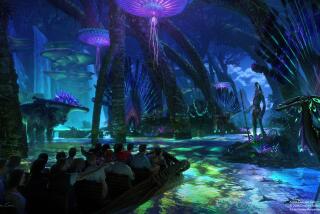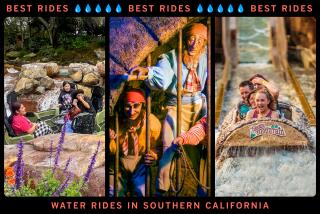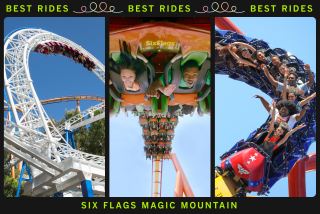How Disney’s imagineers transformed Carland into Cars Land
The idea for a themed land at Disney California Adventure celebrating California’s car culture had been kicking around at Walt Disney Imagineering for years.
The working premise focused on the classic cars, tourist attractions, auto-centric restaurants, roadside architecture and cross-country road trips popular during the 1950s and ‘60s when vehicles became less about transportation and more about personal expression.
> Photos: The evolution of Cars Land at Disney California Adventure
The Carland concept, like many other lands and attractions at Disney California Adventure, lacked one key ingredient: Disney characters.
Then in the summer of 2006, “Cars” became a big box office hit for Pixar and the light bulb went off: Why not turn Carland into Cars Land?
“Let’s build Radiator Springs,” said John Lasseter, Pixar chief and Imagineering advisor.
A year later, Cars Land was unveiled as part of a $1 billion expansion of Disney California Adventure.
> Related: Downtown Radiator Springs | Luigi’s Flying Tires | Mater’s Junkyard Jamboree | Radiator Springs Racers
Set to debut in summer 2012, the 12-acre Cars Land under construction at DCA will feature three new rides set amid a faithful re-creation of the isolated red rock desert town populated by Lightning McQueen and other animated vehicles in the “Cars” film franchise.
Let’s take a closer look at the evolution of Carland into Cars Land, which offers a window into Imagineering’s Blue Sky creative process.
Cruise Street
The origin of Carland began with Cruise Street, a neon-lit streetscape set between 1955 to 1965, when American popular culture was dominated by rock ‘n’ roll, car hops and hot rods.
Concept art of Cruise Street shows a number of vintage vehicles from the period set up in a car show-like atmosphere. Key elements of what would become Cars Land could already be seen in the drawing, particularly the butte that recalls the grill, headlights and hood ornament of an iconic 1950s Chevy.
Over time, the main drag of Carland would eventually evolve into downtown Radiator Springs, the centerpiece of Cars Land.
Marty’s Drive-In
Down at the end of Cruise Street, Marty’s Drive-In typified the Googie architectural style popular with coffee shops and car hops of the era. Marty’s featured a space age design with a diagonal zigzag roofline, cantilevered supports and a futuristic neon sign with an atomic burst.
Eventually, Marty’s Drive-In was repurposed in Cars Land as Flo’s V8 Café, which featured a similar design aesthetic.
Road Trip USA
Combining an Autopia-style attraction with dark ride elements, Road Trip USA probably went through the most iterations during the evolution from Carland to Cars Land.
The original ride concept featured a cross-country road trip in a 1962 station wagon past Mt. Rushmore, under waterfalls and across covered bridges. Along the way, riders would encounter oversized chickens and life-sized dinosaurs designed to entice motorists to stop at roadside attractions.
The ride journeyed through a Nature’s Wonderland-like cavern filled with stalactites and stalagmites and a car wash filled with spinning bristle brushes, blowing air dryers and squirting water jets.
Visitors entered Road Trip USA through a Route 66-style souvenir shop advertising strange, amazing and thrilling attractions not to be missed.
Concept art of Road Trip USA hinted at elements that would end up in the massive Ornament Valley rockwork that will dominate Cars Land, including the distinctive Cadillac Ridge and the jutting Gas Cap butte.
A second version of Road Trip USA added a Disney character overlay called Goofy About Road Trips, based on the 1995 “A Goofy Movie” about a cross-country road trip by the anthropomorphic dog. The attraction took riders on a journey with the absentminded Goofy where things went awry and mayhem ensued.
A third version of Road Trip USA dubbed Sally’s Road Rally took visitors through familiar locations in Radiator Springs and into the world of the “Cars” characters. Those plans ultimately inspired the development of downtown Radiator Springs as the centerpiece of Cars Land.
Ultimately, many of the ideas developed for Road Trip USA and its descendants showed up in Radiator Springs Racers, an indoor-outdoor attraction combining a leisurely dark ride prelude with a dueling side-by-side race-car finale. Similarly, the Route 66 souvenir shop morphed into the Radiator Springs Curio Shop.
Junkyard Jamboree
Originally conceived as a dark ride, Junkyard Jamboree would have taken visitors through an auto salvage yard where old junkers came to life after dark and played music. Animatronic characters built from random car parts would transform into musicians in a band called Johnny V8 and the Rev Tones.
Imagineers dropped the ride concept but kept the name, with Mater’s Junkyard Jamboree reimagined for Cars Land as a cross between a traditional teacup ride and classic whip ride.
The final concept drawing of Carland included many elements that would eventually migrate to Cars Land, with an expansive Radiator Springs Racers ride dominating the horizon and an embryonic version of Luigi’s Flying Tires levitating bumper cars taking shape.
More to Read
Sign up for The Wild
We’ll help you find the best places to hike, bike and run, as well as the perfect silent spots for meditation and yoga.
You may occasionally receive promotional content from the Los Angeles Times.







